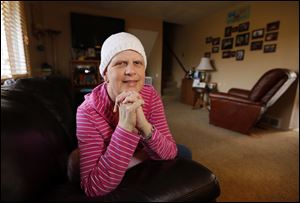
Ovarian cancer has well-earned reputation as a silent killer
12/2/2013
Sherrie Nimigean is battling stage 3c ovarian cancer.
When Sherrie Nimigean found out almost two years ago, that she had ovarian cancer, she knew nothing about the disease.
No one in her family had been diagnosed with it, and going by the numbers, Mrs. Nimigean thought she wasn’t at great risk.
She’d had her first pregnancy before age 30, had no family history of the disease, she wasn’t obese, hadn’t started menopause, and was still a few years shy of the age range of women who are most at risk — all factors that may decrease the risks of developing ovarian cancer.
Known as a silent killer, ovarian cancer frequently comes without pain and often goes undetected until it has reached a critical stage. There is no test for the disease and symptoms are often subtle and easily confused with other disorders. Some symptoms may include bloating, growth in the abdomen, changes in urinary patterns, weight loss and fatigue.
A heavy feeling in the pelvis.
Pain in the lower abdomen.
Bleeding from the vagina.
Weight gain or loss.
Abnormal periods.
Unexplained back pain that gets worse.
Gas, nausea, vomiting, or loss of appetite.
Source: National Cancer Institute
“From time to time everybody experiences those things. That’s why [ovarian cancer] is so hard to diagnose,” said Dr. Anthony Armstrong, an obstetrician and gynecologist, and former chief of staff at Mercy St. Vincent.
By the time they get a diagnosis, “three-quarters of women are late stage, because the symptoms are so varied,” Dr. Armstrong said. “A lot of time, the primary care [physician] and even a gynecologist, start to pursue things like irritable bowel syndrome, reflux, bacterial infection — something GI related.”
Mrs. Nimigean suffered from many of the symptoms, but she wasn’t overly concerned because her doctors thought they were signs of early menopause, she said. Then came a urinary tract infection, followed by a second one. Now she was worried.
“I’d never had one and then all of a sudden I had two within a couple months of each other,” Mrs. Nimigean said. “I told my doctor we needed to look further.”
Ovarian cancer causes more deaths than any other cancer of the female reproductive system, and accounts for about 3 percent of all cancers in women, the Center for Disease Control and Prevention reports. This year, there will be an estimated 22,240 new cases and more than 14,000 ovarian cancer-related deaths, according to the National Cancer Institute.
All women are at risk, but older women are more likely to get the disease than younger women. About 90 percent of women who get ovarian cancer are older than 40, with the greatest number of cases occurring in women aged 60 years or older, the CDC reports.
For the average person, there is not a good screening test, but with a family history or suspicion that something else is going on, things can be done, including genetic testing, ultra sounds and CAT scans Dr. Armstrong said.
“Self awareness is key for early detection,” Dr. Armstrong said. “You know what is normal for yourself. Go to your primary care [doctor] or gynecologists and tell them if something is not right.”
For 10 years, Mrs. Nimigean operated her own cleaning company, specializing in housekeeping, making sure that the homes she cleaned had counter tops that shone and floors that sparkled. Now at age 50, Mrs. Nimigean can barely stand long enough to do her own dishes.
“You look at life so much differently,” said Mrs. Nimgean, who has four children and four grandchildren. “You appreciate the small things, the sunshine, the flowers, trees and wind.”
When’s she not resting, she makes a point to spend as much time with her family as possible. Family vacations are mandatory and on Sundays everyone gathers for dinner at the house, where teal ribbons are tied around trees and lamp post in the yard. They symbolize ovarian cancer awareness and support.
Mrs. Nimigean’s cancer is stage T3c, meaning the disease has spread to the abdominal lining outside the pelvis and the cancer metastases are larger than two centimeters. She recently got news that the cancer has spread to her liver.
Her husband Gregory planned to retired three years ago, but the economy declined and then Mrs. Nimigean got sick. He’s worked at Jeep for 36 years. With medical bills piling up, “he can’t afford to retire.”
After a-year-and-a-half of chemotherapy, Mrs. Nimigean joined a clinical trial at the Karmanos Cancer Institute in Detroit. She’ll find out this month if the pills, which are suppose to shrink her cancer cells, are working.
“I’m in the fight for my life. Anybody given this type of diagnosis would do anything to make sure they’re here a little longer,” Mrs. Nimigean said. “I’m hoping that if I don’t make it through this, it’ll save my kids or someone else’s.”
Contact RoNeisha Mullen at: rmullen@theblade.com or 419-724-6133.